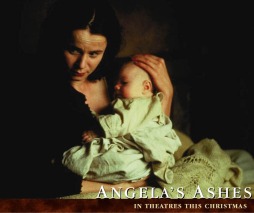| Angela's Ashes |
| |
 |
Ireland/USA, 1999. Rated
R. 145 minutes.
Cast: Emily Watson, Robert Carlyle,
Joe Breen, Ciaran Owens, Michael Legge, Ronnie Masterson, Pauline McLynn,
Liam Carney, Eanna MacLiam
Writer(s): Laura Jones and Alan Parker (screenplay) from the memoir
by Frank McCourt
Music: John Williams
Cinematographer: Michael Seresin
Producer(s): David Brown, Alan Parker, and Scott Rudin
Director: Alan Parker
LINKS
|
 ngela's
Ashes is a movie that accurately recreates an environment down to the last
detail. Those who have read Frank McCourt's book describe it as faithful to
the letter, but not the spirit, of his memoir. I haven't read the book, so this
review reflects only conclusions drawn from the film itself. It's a passionless
affair, despite John Williams' eagerly uplifting score and damp, dank photography
that makes you wish you brought an umbrella to the theater. After the two and
a half hour slog through every indignity and pain that poverty can lay upon
a person, one wonders what the point was. Was it simply to record a set of excruciating
experiences? Was it to inspire us to overcome our relatively minor struggles
in our own lives? Was is to make us feel grateful for what we take for granted?
Those are the only conclusions to be drawn from this adaptation, it appears.
There was little evidence of the much-lauded ironic humor that fans of the book
remember tempered the woeful tales. Angela's Ashes, for all its length
and gravity, is nothing special.
ngela's
Ashes is a movie that accurately recreates an environment down to the last
detail. Those who have read Frank McCourt's book describe it as faithful to
the letter, but not the spirit, of his memoir. I haven't read the book, so this
review reflects only conclusions drawn from the film itself. It's a passionless
affair, despite John Williams' eagerly uplifting score and damp, dank photography
that makes you wish you brought an umbrella to the theater. After the two and
a half hour slog through every indignity and pain that poverty can lay upon
a person, one wonders what the point was. Was it simply to record a set of excruciating
experiences? Was it to inspire us to overcome our relatively minor struggles
in our own lives? Was is to make us feel grateful for what we take for granted?
Those are the only conclusions to be drawn from this adaptation, it appears.
There was little evidence of the much-lauded ironic humor that fans of the book
remember tempered the woeful tales. Angela's Ashes, for all its length
and gravity, is nothing special.
Told from the perspective of an adult recalling his upbringing, the story concerns
young Frank McCourt, the oldest child of an Irish Catholic mother Angela (Emily
Watson) and a Northern Irish Protestant father Malachy (Robert Carlyle). Frank
must have an amazingly gifted memory, because his tale begins when he's very
young, at an age where one barely even remembers if they had siblings. He is
able to recount all the details with ease, however. Frank is played by three
different actors over the course of the film; Young Frankie is Joe Breen, Middle
Frank is Ciaran Owens, Older Frank is Michael Legge. (As near as I could tell,
their ages were 6, 12, and 17.) After a brief prologue in the United States,
little Frankie and his family move back to Ireland in a rare instance of reverse
immigration. Their time in the United States had been miserable, one of Frankie's
siblings died, and Angela had been declared an unfit mother. They relocate to
Limerick, Ireland, the wettest town in the one of the wettest countries in Europe.
In Limerick, their problems worsen.
The greatest cause for their misfortune is the difference in religious affiliation
between Angela and Malachy. This is a little difficult to convey to an American
audience. In the United States, the difference between a Protestant and Catholic
is negligible, and parents of either Christian denomination marry each other
all the time. Ireland's country is torn apart by these differences (the "why"
is a longer question than I could answer in this review, but I would suggest
checking out Pat Coogan's The
Troubles instead). As a result, the McCourts have trouble gaining acceptance
in Ireland. Angela's family won't let them move in, the Catholic charities are
derisive and rude when Angela seeks help, and little Frankie is shunned in his
attempts to become an altar boy. The conditions of their home are depicted like
paintings of squalor. The lower floor is always submerged in ankle-deep water;
lice and mice infest every room, and urine is present in a place where urine
has no business being. As we can plainly see, the McCourts are poor and live
unhealthily. But it's not unbearable! The voice-over attempts to leaven the
dreary circumstances with some injections of humor, but the visuals are so overpowering
that the words come out limp and instantly forgotten. The tragedies come with
such frequency that individually their effect is diminished until they almost
become tiresome.
The movie spends its time showing how Frankie's parents deal with the family's
situation and how Frankie's experiences in school were often no respite for
his troubles at home. Frankie's father Malachy is the epitome of the shiftless
drunk who won't/can't get a job because he believes he's going to be unable
to keep it anyway. He halfheartedly searches for work, and often is denied a
job because he is Protestant. When he does land a job, his fear grabs hold and
he pre-emptively confirms everyone else's belief of his worthlessness by squandering
the first check on alcohol and not showing up to work the following week. Frankie
would have plenty of reason to hate his father for being too weak to support
his family, but he knows that Malachy is not an evil man, just a pathetic one.
He is nice to Angela, and to Frankie and the kids, telling them charming stories
in the mornings. In Frankie's mind, this offsets the evenings when he comes
home drunk and demolishes the place. Angela has considerably more pluck, and
unlike Malachy, doesn't retain the useless bit of pride that keeps one from
asking for handouts when all other options have failed. Angela always seems
to be a bit sick, and perhaps too trusting, but her determination is what keeps
them together. In the end though, Malachy abandons them, most likely out of
shame, and Frankie must support the family.
The last act of the film concerns Frankie's attempts to save enough money to
go back to America and leave this misery (and his family) behind. He gets a
good job, falls in love for the first time (in one of the few bits of dark humor
that actually works, his consumptive lover promptly dies on him), and moves
out of the house and in with an uncle. Perhaps because we are seeing the light
at the end of the tunnel for Frankie, it seems to rain a lot less in the last
part of the movie. As an epic story of survival, the film fails to provide any
scene worth remembering, though. The musical score suggests that a scene near
the end where Frankie tosses into the sea a ledger containing all his neighbors'
debts is a moment of sublime triumph. In fact, it feels self-righteous, as Frankie
himself was recently responsible for enforcing those very debts. When the movie
finally ships itself out to sea, we are merely relieved instead of moved.
Angela's Ashes gets an above average grade because the acting, though
not spectacular, is very good. Emily Watson reigns in her emotions for a change.
Her performance attains a quiet significance in its defiant suffering. Robert
Carlyle is convincingly helpless and lacking in self-esteem. He could have gone
the drunken lout route he took in Trainspotting, but is more effective
as simply a poor provider. The three young actors who play Frank McCourt are
all adequate, with Joe Breen as the youngest being the most memorable. All of
the fine acting and sharp photography keep the film from being bad--one never
thinks one is watching an awful film. It's the cumulative effect that comes
off as unimpressive, as the film never attempts anything beyond an accurate
display of destitution. If you need a downer, though, Angela's Ashes is
good medicine.
Note: Jeff later changed his rating for this film from a C+
to a C.
Review
© February 2000 by AboutFilm.Com and the author.
Images © 1999 Paramount Pictures. All rights reserved.


